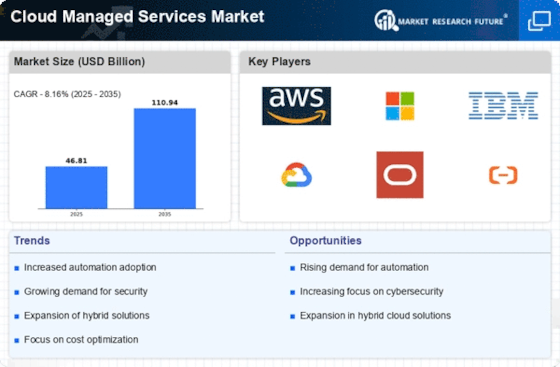Market Analysis
In-depth Analysis of Cloud Managed Services Market Industry Landscape
Cloud Managed Services (CMS) market dynamics are shaped by a convergence of variables that affect growth and competition. CMS demand has increased as firms use cloud computing to streamline operations. Organizations need to offload the burden of maintaining their cloud infrastructure and apps to concentrate on their core skills, fueling this boom. This change from conventional IT administration to cloud-based solutions has made CMS popular. Market factors include rising service provider rivalry. More participants in the CMS business have made it intensely competitive, resulting in constant service and price changes. Global giants and tiny enterprises compete for market share. Innovation has resulted from suppliers providing specialized services, strong security, and improved performance optimization to compete. Awareness of cloud managed services' advantages among organizations of all sizes is another major market aspect. SMEs are realizing that CMS's cost-effectiveness and flexibility allow them to access sophisticated IT capabilities without a large upfront expenditure. However, large organizations are using CMS to simplify processes, increase flexibility, and adapt faster to market changes. Awareness is projected to drive CMS market growth in the approaching years. The worldwide CMS market is dynamic because suppliers try to fulfill the demands of customers in various locations. Geographical, legislative, and data sovereignty issues affect CMS provider plans. Effectively navigating these challenges is key to commercial success. Compliant solutions, data security, and region-specific needs provide providers an advantage. CMS market dynamics are also shaped by security concerns. As organizations commit their important data and apps to cloud service providers, security is crucial. CMS suppliers update their security to combat new cyberattacks. Providing a safe and compliant environment is a differentiator and a need for consumer confidence. Technological change makes the CMS market dynamic. CMS products are including AI, ML, and edge computing. These solutions improve automation, predictive analysis, and efficiency to meet the rising need for intelligent and proactive cloud administration. Changing client choices affect market dynamics. Multi-cloud methods, where companies employ numerous cloud providers, are growing. The need to avoid vendor lock-in, minimize costs, and use alternative cloud platforms for specialized workloads drives this trend. CMS suppliers who can smoothly connect and manage multi-cloud setups can fulfill customers' changing demands. The COVID-19 epidemic has also affected CMS market dynamics. The epidemic accelerated digital change, emphasizing the need for robust and scalable cloud infrastructure. CMS with agility, scalability, and cost-efficiency is predicted to stay popular as firms adjust their strategy post-pandemic.


















Leave a Comment